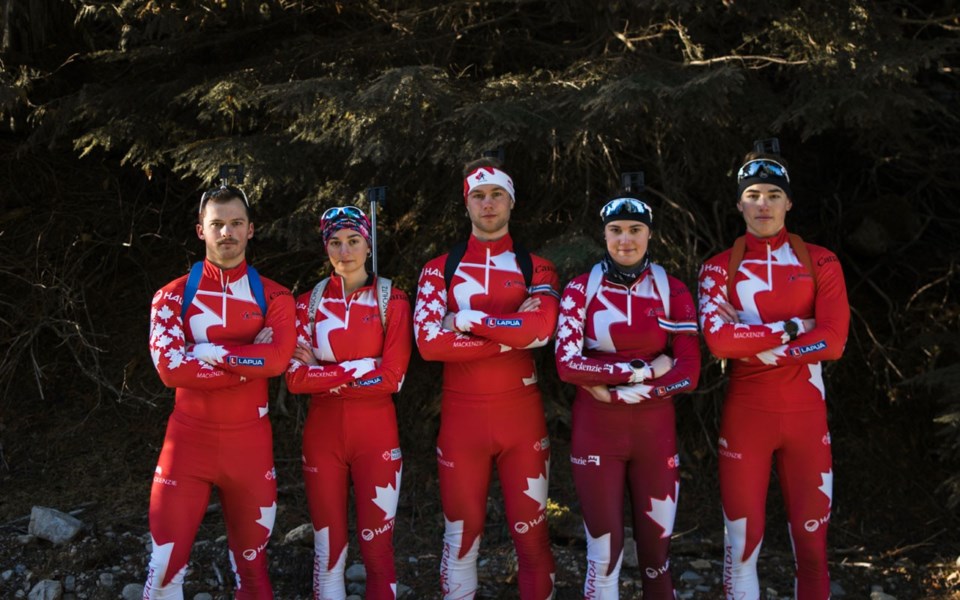In its third year of operation, the Whistler Nordic Development Centre (WNDC) is well on its way to changing the face of Canadian biathlon.
The centre has already established itself as a leader in attracting the country's top young biathletes, which was demonstrated when Biathlon Canada announced its roster for two upcoming International Biathlon Union Junior World Cup races. Of the 10 athletes who will head to races in Lenzerheide, Switzerland and Premanon, France later this month, six come from the WNDC. Three of the athletes—Larissa Black, Gillian Gowling and Ryan Elden—are veterans while the other three, Sergey Bochkarnikov, Lucas Smith and Zoe Pekos, are new this year.
WNDC head coach Etienne Letondeur said he had high hopes for the 2018-19 crew, but to have his athletes make up more than half the team exceeded his expectations.
"I was not expecting to have that many athletes on that tour. We were definitely aiming to have some of them possibly travelling to the first two," he said. "It's a big deal for us."
Letondeur said the program is designed for budding athletes, so when they head to Europe, they will face competition two or more years older than them.
"The goal is to get exposure and the experience of racing in Europe, learning how to travel," he said. "They'll learn to race at the international level. In Europe, the level is much, much higher and the Junior World Cup is always a big step compared to the races that we have here in North America."
The new athletes have varying levels of international experience. Bochkarnikov attended a Junior World Cup last season, so he has some idea of what to expect. After moving from Calgary, he's eager to make his new club look good."It's a huge accomplishment for me. It's my first year with WNDC and I hope I get a chance to represent them well overseas," he said. "It's also a big learning opportunity for me to learn from the best nations in the world, to see them up close and personal."
Pekos will be making her Junior World Cup debut, though she competed at last year's Junior World Championships in Estonia to give her a taste of international competition in her first year of biathlon.
"The equipment check and everything seems so much more chill when you're just racing in Canada, but going over to Europe, it's this big thing," she said. "There are screens everywhere and it's so official.
"Everything just seems so much bigger."
Pekos, who is originally from Toronto, said her shooting vastly improved this summer after she joined the WNDC, though she felt that she didn't show it during trials and was pleasantly surprised to make the national squad.
"In practices, I feel like I'm more accurate. I just have to put it together in competition," she said.
Winnipeg's Lucas Smith, meanwhile, was thrilled to crack the team for his first-ever international competition.
"It means a lot in terms of validating the hard work we put in and shows what sort of things can happen when you really work hard all summer and put things together," he said. "It'll be a new experience for everybody every single time, so I'm just expecting to learn a lot. We'll be up against some really tough competition."
While Smith said he's made gains since joining the WNDC, his better footwork in particular has been noticeable since moving from the prairies.
"It's a completely new experience coming from somewhere where you only do biathlon part time," he said. "Overall as a biathlete, I think I've definitely improved, and my skiing has become a lot better in terms of fitness in general as well as technique and finesse."
Even with the lack of snow on the ground, WNDC athletes have been working since mid-October on snow stored from last season dubbed Callaghan Gold. There is only enough for a one-kilometre loop, but the repetition could have some fringe benefits.
"It's a little mind-numbing," Bochkarnikov said with a chuckle, "but it's fine because you can focus on technique and tempo."
All in all, Bochkarnikov feels the local representatives could be making waves on the global scene sooner than some might expect.
"We've imagined the top nations of the world as being that much better than us in every single way, but when I went last year, I found that that wasn't really true. They're not really that far ahead of us or that much better than us," he said. "We have the chance to compete and win medals out there."




